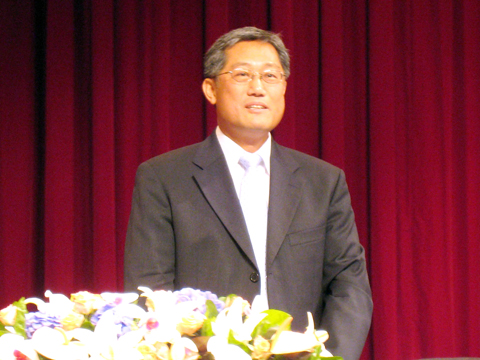Lee Kun-yao (李焜耀), chairman of AU Optronics Corp (友達) and Qisda Corp (佳世達), was acquitted on six charges including insider trading, stock manipulation and embezzlement after a two-year trial.
The executive of Qisda, the electronics maker formerly known as BenQ Corp (明基電通), was cleared by a Taoyuan District Court judge of using insider information to trade stock before the public disclosure of financial statements.
Lee, 56, was indicted two years ago for alleged crimes during his tenure as chairman of BenQ, which at the time was Taiwan’s biggest maker of mobile phones.

PHOTO: SU CHIN-FENG, TAIPEI TIMES
The company lost a total of NT$32.84 billion (US$997 million) in 2005 and 2006 after buying Siemens AG’s unprofitable handset unit.
“I’m pleased with the verdict,” Kevin Hsiao, Lee’s lawyer said outside the court yesterday.
Lee was also acquitted on charges of breach of trust, money laundering and forgery.
Qisda fell 4.9 percent to close at NT$13.55 in Taipei, before the ruling. The stock has more than doubled this year, after falling to a record low of NT$5.17 last November. AU declined 3 percent to NT$32.15 yesterday.
The two years of losses at BenQ, which became Taiwan’s biggest mobile-phone maker after buying Siemens AG’s handset unit in 2005, erased all the profit it had made since 1999.
The company filed for insolvency protection for its European business in September 2006 and sold its camera business, office buildings in Taiwan and part of its stake in AU Optronics.
Former BenQ president Sheaffer Lee (李錫華), ex-chief financial officer Eric Yu (游克用), Alex Liu (劉維宇), who was associate vice president in the finance department, and Liu Da-wen (劉大文), an accounting manager, were also acquitted by the court yesterday.
In May 2007, prosecutors alleged the BenQ executives used Creo Venture Corp, a Malaysian unit formed in 2002, to trade employees’ bonus shares.
The BenQ officials paid income taxes with proceeds from the transactions, prosecutors said.
Creo held 25.9 million BenQ shares as of March 20, 2006, making it the ninth-largest shareholder in BenQ, prosecutors said.

WEAKER ACTIVITY: The sharpest deterioration was seen in the electronics and optical components sector, with the production index falling 13.2 points to 44.5 Taiwan’s manufacturing sector last month contracted for a second consecutive month, with the purchasing managers’ index (PMI) slipping to 48, reflecting ongoing caution over trade uncertainties, the Chung-Hua Institution for Economic Research (CIER, 中華經濟研究院) said yesterday. The decline reflects growing caution among companies amid uncertainty surrounding US tariffs, semiconductor duties and automotive import levies, and it is also likely linked to fading front-loading activity, CIER president Lien Hsien-ming (連賢明) said. “Some clients have started shifting orders to Southeast Asian countries where tariff regimes are already clear,” Lien told a news conference. Firms across the supply chain are also lowering stock levels to mitigate

Six Taiwanese companies, including contract chipmaker Taiwan Semiconductor Manufacturing Co (TSMC, 台積電), made the 2025 Fortune Global 500 list of the world’s largest firms by revenue. In a report published by New York-based Fortune magazine on Tuesday, Hon Hai Precision Industry Co (鴻海精密), also known as Foxconn Technology Group (富士康科技集團), ranked highest among Taiwanese firms, placing 28th with revenue of US$213.69 billion. Up 60 spots from last year, TSMC rose to No. 126 with US$90.16 billion in revenue, followed by Quanta Computer Inc (廣達) at 348th, Pegatron Corp (和碩) at 461st, CPC Corp, Taiwan (台灣中油) at 494th and Wistron Corp (緯創) at

NEGOTIATIONS: Semiconductors play an outsized role in Taiwan’s industrial and economic development and are a major driver of the Taiwan-US trade imbalance With US President Donald Trump threatening to impose tariffs on semiconductors, Taiwan is expected to face a significant challenge, as information and communications technology (ICT) products account for more than 70 percent of its exports to the US, Chung-Hua Institution for Economic Research (CIER, 中華經濟研究院) president Lien Hsien-ming (連賢明) said on Friday. Compared with other countries, semiconductors play a disproportionately large role in Taiwan’s industrial and economic development, Lien said. As the sixth-largest contributor to the US trade deficit, Taiwan recorded a US$73.9 billion trade surplus with the US last year — up from US$47.8 billion in 2023 — driven by strong

ASE Technology Holding Co (ASE, 日月光投控), the world’s biggest chip assembly and testing service provider, yesterday said it would boost equipment capital expenditure by up to 16 percent for this year to cope with strong customer demand for artificial intelligence (AI) applications. Aside from AI, a growing demand for semiconductors used in the automotive and industrial sectors is to drive ASE’s capacity next year, the Kaohsiung-based company said. “We do see the disparity between AI and other general sectors, and that pretty much aligns the scenario in the first half of this year,” ASE chief operating officer Tien Wu (吳田玉) told an